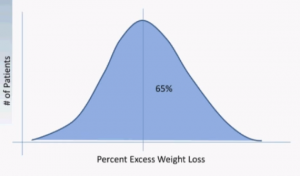Before going through bariatric surgery, patients often ask the question of “how much do I lose after my surgery?” It is important to know the variables involved to have a clear idea of going through the process. But as you will see, it is a difficult question to answer and in the end, it may not even matter.
What Is Your Goal Weight?

It is hard to answer this question as the weight loss is variable one year after surgery. Weight loss after a year is averaging at about 65% (see the bluebell curve). Of course, it is crucial to be compliant with the nutritional guidelines after surgery. But, It is possible that patients that are 100% compliant and follow every rule not lose as much as the average. Here are the clinical predictors of weight loss:
- Age – Younger lose more weight
- Diabetes – Don’t lose as much
- Physical Activity – Lose more with physical activity and exercise
- Race – African American lose less
- Bipolar Disorder – Lose less weight loss
- Smoking – Nicotine lowers set-point in general
In summary, the best predictor in the first year is your genetics and not so much environment. If you have had a close relative done weight loss, your results are likely to be very similar to theirs. In the first year, genetics has a much more impact on weight loss than the environment. Once you reach your goal weight, it’s important to maintain it!
Weight Loss After 3 Years And Beyond

The first-year weight loss is magical and easier to reach – it is the “honeymoon” period. There is going to be a little bit of weight regain after the first year. Another obvious variable that kicks in beyond genes is the environment. There is more weight loss variability after 1st year (averaged at 55% – see the yellow bell curve) and depends on:
- Food Intake
- Sleep
- Level of Physical Activity
- Medications
- Stress
In three years, the environment plays an equal role as genetics does in weight loss. As the years go by, the environmental factors start to have much more impact. Therefore, the longevity of your weight loss depends on the decisions you make in your daily life.
What Is A Success After Weight Loss Surgery?

Ideal Weight – There is a range of healthy body weight based on height for females and males for their frame size (see the table). The following example shows how it is calculated:
For example, a 5′ 6”, 280 lb female has a ideal body weight of 100 lb + 6 x 5 lb = 130 lb. If she loses 65% (average) of excess body fat of 150 lb, she will be at 180 lb after one year.
Success After Weight Loss Surgery – The weight you lose after one year or more years ceases to bring you happiness.
Success is achieved if you develop a healthy relationship with food and your body.
That is if you look in the mirror and feel good. That is if you can sit down and enjoy your meal.
To take control of your life and start a new life, contact us to see with Mexico Bariatric Center has to offer to help you rid of obesity.
Reference



